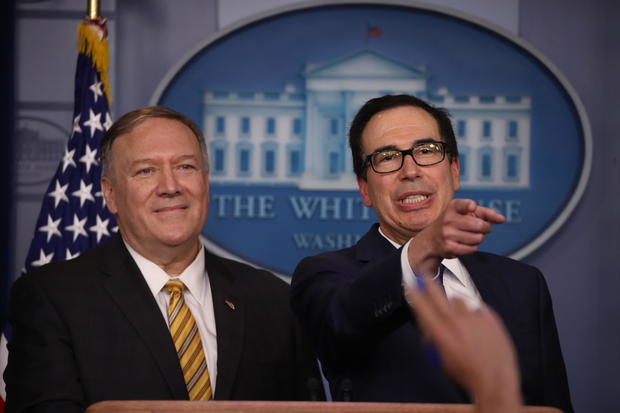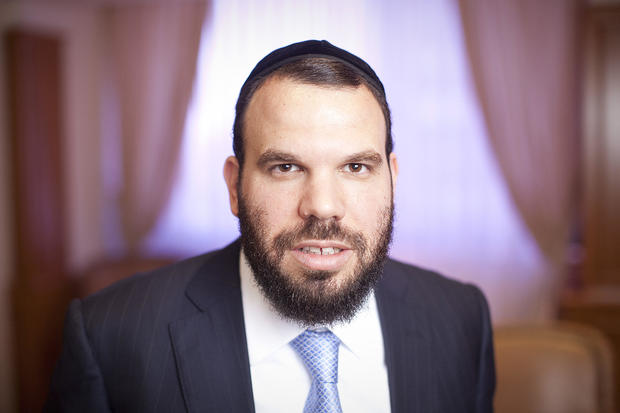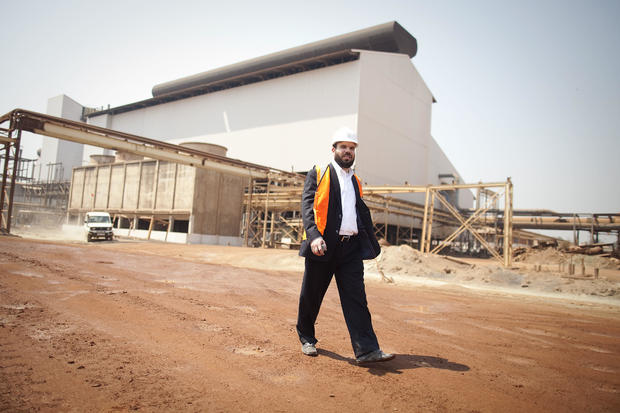New documents show top Trump officials disregarded concerns by State Dept. staff in relaxing sanctions on Israeli
It was one of the final decisions Trump officials made before leaving office. On January 15, 2021, the Treasury Department eased sanctions on Israeli billionaire Dan Gertler, temporarily restoring his access to a web of companies and frozen bank accounts that U.S. officials say he used to bilk more than $1.3 billion in mining revenues from the Democratic Republic of Congo.
Nearly two years later, CBS News has learned the sign-off came despite strong objections from some senior State Department officials, who, documents suggest, were denied an audience to make their case to then-Secretary of State Mike Pompeo.
Mark Wilson / Getty Images
The Treasury Department must coordinate lifting sanctions with the State Department, among others. Nothing has surfaced indicating the State Department formally objected to easing the sanctions on Gertler and his companies.
The documents, obtained via a Freedom of Information Act request by the nonprofit watchdog group Citizens for Responsibility and Ethics in Washington (CREW), also shed further light on the intense lobbying campaign by Gertler and his attorneys, including former FBI Director Louis Freeh and former Trump private attorney Alan Dershowitz, who argued for relieving Gertler of sanctions.
“I am not aware of any other case where sanctions were essentially removed without a clear factual basis justifying the removal,” said John Smith, who headed the Treasury Department’s Office of Foreign Asset Control in 2017 when Gertler was originally sanctioned. In Smith’s view, “what seemed to be absent in this case was a legal reason to remove these sanctions as opposed to a political basis.”
Smith said while Gertler wasn’t technically de-listed, he was issued a license that in effect served the same purpose, and allowed the administration to grant him sanctions relief without public disclosure, which he said would have triggered scrutiny.
Within weeks of inauguration, the Biden administration reimposed broad sanctions on Gertler, citing his “extensive public corruption.”
Still, Smith said the businessman would have had access to any previously sanctioned bank accounts or property from the moment the license was issued.
Gertler declined a request for an interview. However, in response to a CBS News inquiry, a representative for Gertler said “no transactions whatsoever were made and Mr. Getler continued to operate as if no [license] had been granted and the sanctions remained in force.”
Simon Dawson/Bloomberg via Getty Images
Gertler was first sanctioned in 2017 by the Treasury Department, which said the businessman leveraged his relationship with former Congolese President Joseph Kabila to serve as “a middleman” between multinational companies looking to do business with the mineral-rich Congolese state. The department said Gertler “amassed a fortune through hundreds of millions of dollars’ worth of opaque and corrupt mining and oil deals.”
As far back as 2001, Gertler has been accused of propping up the former regime in the Democratic Republic of Congo, or DRC by providing “money, weapons, and military training” in exchange for access to so-called blood or “conflict” diamonds, according to a United Nations report.
Ambassador J. Peter Pham, who helped devise the sanctions package, told CBS News Gertler’s activities in the DRC extended beyond diamonds to rare metals like cobalt, which are crucial for electric vehicle production.
“Without the DRC’s cobalt, we don’t have a ‘green tech’ revolution,” said Pham, who served as a special envoy in the Trump administration for the Great Lakes region of Africa.
Pham was strongly critical about Gertler’s central role in the mining activities in the DRC and raised those concerns at the State Department.
Simon Dawson/Bloomberg via Getty Images
Gertler’s representative said he “has never accepted the basis upon which the sanctions were imposed on him, and denies any wrongdoing.” Nevertheless, the representative said “he has at all times abided by them in full, and will continue to do so.”
“Like pulling teeth”
An email obtained by CREW and shared with CBS News says Freeh and Dershowitz were lobbying State Department officials on Gertler’s behalf as early as 2019.
“They are seeking support and guidance for their forthcoming petition to Treasury to delist Gertler from the Global Magnitsky Act sanction, as imposed in December 2017 for corruption and bribery, e.g., undervaluing mining concessions and then reselling for a huge profit, which supported Kaliba’s continued oppressive reign,” wrote one State Department official to her colleagues.
In the email, the official said Freeh, Dershowitz and other attorneys working for Gertler argued why he should be relieved of sanctions, including his readiness “to wield his influence in support of US interests in the DRC and against Russia and China.”
Reached by phone, Dershowitz told CBS News he also met with Trump administration Treasury Secretary Steven Mnuchin “three or four times” on Gertler’s behalf and Mnuchin “seemed to have an open mind.” Dershowitz said the effort included circulating a video Gertler’s team produced showing the businessman’s humanitarian efforts in the DRC.
“He had completely changed,” Dershowitz said of Gertler. “We were asking for a probationary period to prove that he could continue to do business in a completely legitimate way.”
Dershowitz, who said his role was limited to presenting the legal arguments in favor of easing Gertler’s sanctions, denied the issuance of the license was a snap decision made in the final days of the administration.
“It was a slow, grueling process, like pulling teeth,” he said. “Eventually though, we succeeded.”
He said a breakthrough came when the Israeli government got involved, and raised “national security issues” that “went pretty high up” — though Dershowitz said he was “kept out of the loop” on such issues.
The New York Times previously reported the U.S. told Israel Gertler’s sanctions would be eased “out of reasons of American national security.”
The Embassy of Israel did not respond to a request for comment.
Pham said he was also lobbied by Freeh and his associate, and they did not present any national security reasons that would justify relaxing the sanctions on Gertler.
“They were speaking in generalities,” said Pham. “They couldn’t give me any specifics of what Gertler had done to change his stripes.”
Through a spokesperson, Freeh denied any involvement in the licensing application and decision, saying he first learned of this from media reports, but did not respond to a question about the meeting with State Department officials.
“U.S. credibility has been significantly damaged”
On Nov. 2, 2020, Assistant Secretary of State Peter Haas, a career official, wrote to Pompeo asking for a meeting. According to the declassified State Department memo, department officials were notified in October 2020 by counterparts in the Treasury Department that it would approve Gertler’s license “absent State’s objection.” Markings on the memo suggest Pompeo declined to take the meeting.
A second memo suggests Gertler was granted not one, but two licenses in the waning days of the Trump administration. The first, in November 2020, allowed Gertler to distribute “$10 million of his wealth through the DRC for what he claims are charitable purposes” and the second, in January 2021, provided him “sweeping sanctions relief.”
The January 2021 license was first reported by another nonprofit watchdog group, The Sentry, and was issued at the same time Dershowitz was advising Trump on his impeachment legal defense in the wake of the Jan. 6 attack on the Capitol. Dershowitz said he never spoke with Trump about Gertler.
On Jan. 29, 2021, eight days after Joe Biden took office, Haas urged Pompeo’s successor, Secretary of State Antony Blinken to revoke the two licenses.
“These licenses provide Gertler significant opportunities to exert malign influence in the DRC in a way that would undermine U.S. interests,” Haas wrote in a declassified memo, adding, “U.S. credibility has been significantly damaged.”
The State Department declined to make Haas available for comment. In March, after Biden took office, the Department revoked the licenses.
Gertler’s representative said he was “legally entitled to petition for delisting” and that the temporary license “was granted on its merits” and in accordance with the law.
In a request sent to the inspectors general at the State and Treasury Departments Friday, CREW asked for an investigation into whether Pompeo and Mnuchin may have violated sanctions laws and into any transactions Gertler executed while the licenses were in place.
A spokesperson for Mnuchin told CBS News the former Treasury Secretary cannot discuss deliberations concerning any specific past action taken by the arm of the department that handles sanctions. A spokesperson for Pompeo did not respond to questions about his role.
Pham said he’s worried the U.S. government has sent a message to bad actors that they might be able to get relief if they hire the right lobbyists.
“It certainly took a bite out of the fear of sanctions,” he said.
For all the latest World News Click Here
For the latest news and updates, follow us on Google News.




